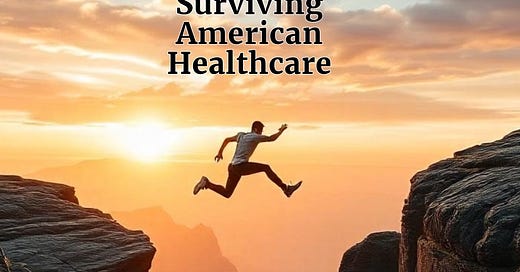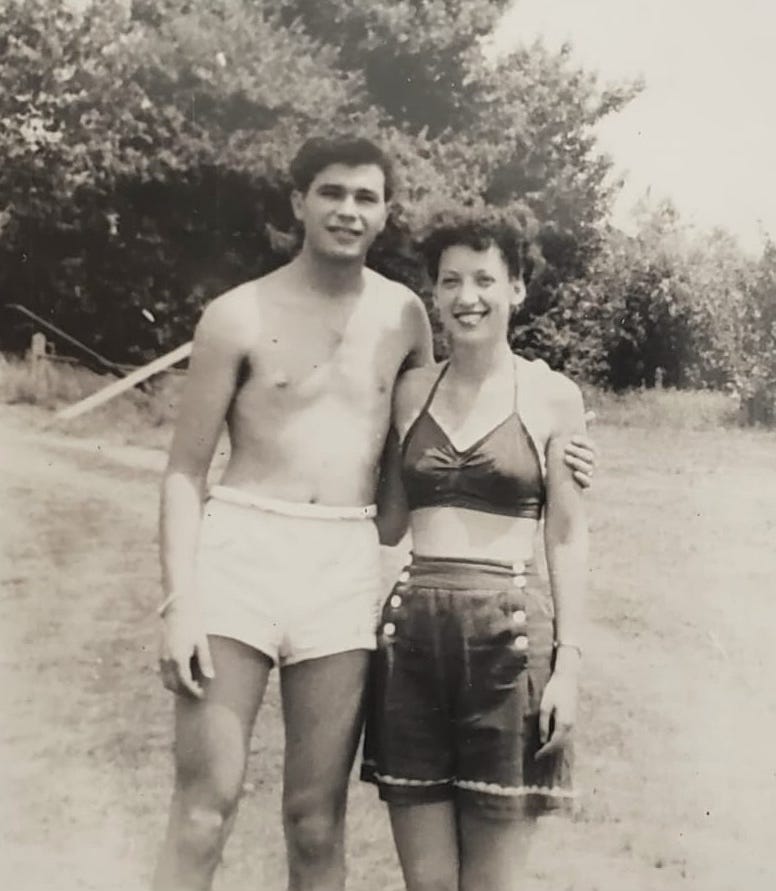I’ve learned a great deal about surviving the American healthcare system –– the hard way –– by making a lot of mistakes, as a mother, daughter, wife, and as a patient. While I’m now able to apply what I’ve learned for my family and to my columns and articles, I realized that most of what I know has never been compiled and shared.
Until today.
For 2025, Patient No More will be the home of A Guide to Surviving American Healthcare. Chapter-by-chapter, month-by-month, I’ll share survival tactics for each type of medical encounter from preparing for a primary care visit to dealing with emergencies, making major medical decisions and small ones. [and, YES, it’s still FREE!]
This guide will start in two weeks with Chapter 1: How Bad is American Healthcare, Really?, a basic map to where the landmines, trip hazards, and cliffs lay so you can steer around them. Wherever you live, chances are you know that getting good medical care is challenging and there’s little sign it’s going to improve in the near future. How it’s structured, financed, taught, and applied is seriously flawed. The doctors and nurses have become victims of the system just as the patients have. The corporatization of healthcare (Profits > Patients) has interfered with their ability to do their job most effectively. That’s one of many reasons why so many resigned from clinical care in what is known as the Great Resignation from 2020 to 2024. [Read Where Have All My Doctors Gone.]
Advocating for ourselves as patients is a survival skill.
Let’s see what we can accomplish, together.
Patients can’t quit. We need help when we’re sick or injured and despite all the support we can give one another, we still need trained medical professionals. So, I’m calling it: American healthcare is unsafe for too many Americans. Misdiagnosis, surgical error, screwed up testing, medication mistakes, medical racism, misogyny, gaslighting and more. The issues we already know about will directly affect all of us at least once in our lives and the people we love at least once in their lives. I’ve also been misdiagnosed and harmed multiple times. Perhaps like me, you’ve been mistreated by medicine several times already and you’re fed up.
I want to share the help I wish I had when my son’s health was unraveling and his medical mystery deepening. I learned more than I wanted to know about the danger zones of American healthcare due to my son’s almost decade-long diagnostic odyssey that nearly killed him at 15. His medical mystery was a lousy way to witness how American healthcare works. and it’s gotten worse on every metric. He’s thriving now but I wrote a book about our journey through hell. [If you’re a literary agent, contact me. It’s a thriller.] I felt so alone those years; except for my husband, there was no one who understood, offered a helping hand, or an uncritical ear.
I also advocated for my elderly parents’ through their multiple medical errors and harm. They both lived long and amazing lives, until their mid-90s. Yet, their deaths were still premature, due to unnecessary medical harm and diagnostic delays.
Despite my access to experts, I need YOU. This will be a living, interactive guide.
I made every mistake and learned from it. That’s why I’ve dedicated my time and energy to learning more. Because of what my family experienced, I decided to find out why medical error happens.
It’s why I switched from writing about home design and beauty and became a healthcare journalist. That led to my interviewing a treasure trove of experts: patients, patient advocates, researchers, diagnosticians, patient safety specialists, public health officials, and hospital staff over the years. To understand them, I spent thousands of hours reading medical papers, slowly and painfully. (And now coauthored a few.) My advocacy work led to serving as a board member for two healthcare nonprofits and as an advisor on the patient experience for medical researchers since 2015.
Yet, still, I’m often the only person in the room, on the panel, on the clinical study, in the conference, or speaking and teaching without a Dr. in front of my name or a MD or PhD after my name. I want every patient to be able to do this and advocate for themselves and others.
I’ve learned many ways to navigate the travesty and the tragedy
that has become American healthcare.
Finally, since 2018, I was the creator of a popular column for patients about their role in getting an accurate diagnosis, Dx IQ. Sadly, the web host disappeared in 2024 and the column with it. I hope this Guide will replace it.
I’m not a doctor and I won’t give medical advice. What I can do is help guide you through the process, to prepare for medical encounters, identify key questions to ask, and figure out what is the next best step for your goals. I’ve learned many ways to navigate the travesty and the tragedy that has become American healthcare. Each month, I will drop two chapters.
Despite my access to experts, I need YOU. This will be a living, interactive guide. Your feedback, ideas, questions, stories and warnings are key to what I’ll cover. I want to hear what you want to read about. Please use the comment section below to share what worked for you and what didn’t plus any helpful suggestions. [For your own protection, do not share private medical data you wouldn’t want your neighbor, boss or frenemy knowing.]
Patient No More: A Guide to Surviving American Healthcare will be easy-to-read, easy-to-follow and less than 1,500 words per chapter.
Advocating for ourselves as patients is a survival skill. Let’s see what we can accomplish, together.
Here is an initial list of what I plan to cover in the next year. It begins with an overview of what to watch out for. Every chapter after that will take you step-by-step through medical scenarios you’ll face. Each will offer concrete tips and methods to protect yourself and your family. Thoughts?
I Just Want To Feel Better. What’s a Diagnosis and Why Does It Matter?
How To Shop For The Best Primary Care Doctor. Caveat: If you can find one accepting new patients
Specialists Have Blind Spots. How To Avoid Being Harmed By Them.
Medical Testing Secrets. What You Need To Know And Do When Your Doctor Orders Tests
Chapter 10: Gaslighted, Dismissed or Ignored By Your Doctor?
Get A Second Opinion, Get A Second Opinion, Get A Second Opinion.
I Don’t Know. Why I Prefer Doctors Who Can Express Uncertainty.
I Read It Online. The Good, The Bad and The Ugly Of Online Medical Info.
Thinking Twice About Going Under The Knife. How To Decide If Surgery Is The Best Option.
Rare Diseases Are Common. Why Are They Missed?
Throw Away The Pain Scale. How To Communicate Pain and Be Heard.
4 Million Mistakes. Why It’s Hard To Diagnose Kids.
Hysteria and Wandering Uteruses. Why Women Are So Often Misdiagnosed.
Medical Racism Is Real. How The Color Of Your Skin Affects Your Diagnosis.
Getting Old Is Not For Wimps. The Extra Challenges Of Being A Senior.
Yes, White Men Get Misdiagnosed, Too.
Advocating Is A Vocation and An Avocation. The Many Roles Of Patient Advocates.
Get On Board. Join The Patient Advocacy Movement.
Next up, Chapter 1: How Bad is American Healthcare, Really?
P.S. I won’t try to write about paying for healthcare, insurance, and how to get around the big bills. Despite the recent news and the renewed focus on United Health Care and other major health insurers, I’m not an expert on that. I know it’s important but there are far better writers on those topics. Here are three great books on how to deal with healthcare costs. If you want to recommend any author whose work has been helpful to you, please add their name in a comment below.
AN AMERICAN SICKNESS: How Healthcare Became Big Business and You Can Take It Back by Elisabeth Rosenthal
NEVER PAY THE FIRST BILL: And Other Ways to Fight the Health Care System and Win by Marshall Allen
THE PRICE WE PAY - What Broke American Health Care and How To Fix It by Arthur Gale MD [Note this was written before COVID but still has great tips]
© Helene M. Epstein 2025








Thank you for your commitment to MAHA. We need many more citizens to become active. If you will read garymarklevin.substack.com
Excellent healthcare system here. I'd say that, of course, as I'm married to a doctor. Still, objectively, I truly believe the system is better than the one I've experienced in the US ... especially in south Alabama. Well-meaning and competent people are engaged, but there are many problems and inadequacies. c